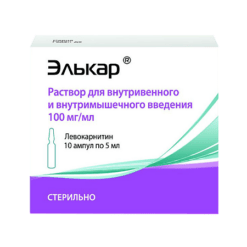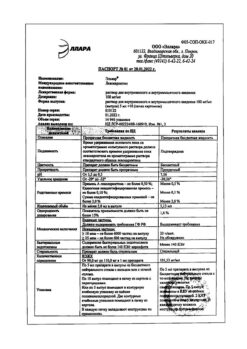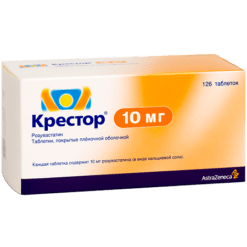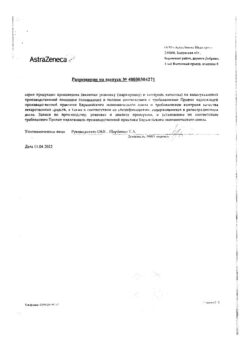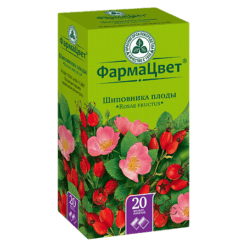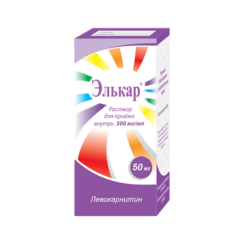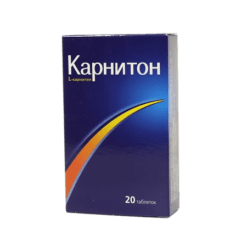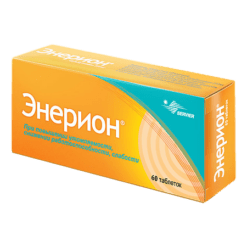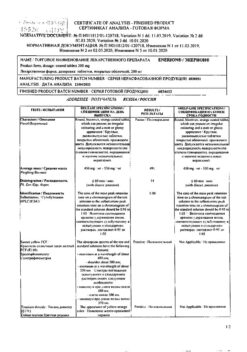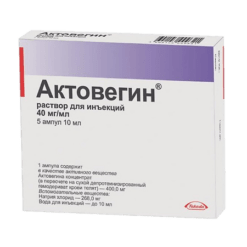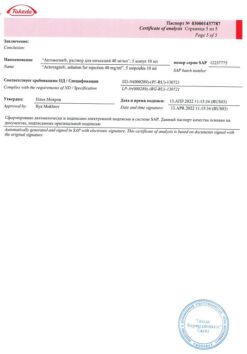No products in the cart.
Elafra, 20 mg 30 pcs.
€1.00
Out of stock
(E-mail when Stock is available)
Description
Pharmgroup:
an immunosuppressive agent.
Pharmic action:
Elafra is a basic disease-modifying antirheumatic drug with antiproliferative effects. The active metabolite of leflunomide, A771726, inhibits the enzyme dihydrorotate dehydrogenase and has antiproliferative activity. In vitro A771726 inhibits mitogen-induced proliferation and DNA synthesis of T-lymphocytes. The antiproliferative activity of A771726 appears to be manifested at the level of pyrimidine biosynthesis, since the addition of uridine to the cell culture eliminates the inhibitory effect of the metabolite A771726.
It was shown using radioisotope ligands that A771726 selectively binds to the enzyme dehydrorotate dehydrogenase, which explains its ability to inhibit this enzyme and lymphocyte proliferation at the G1 stage. At the same time A771726 inhibits the expression of receptors to interleukin-2 and Ki-67 and PCNA antigens associated with the cell cycle.
Therapeutic effect of leflunomide was shown on several experimental models of autoimmune diseases, including rheumatoid arthritis.
Pharmacokinetics:
The absorption of the drug is 82 – 95% and is not dependent on food intake. The period to reach a stable plasma concentration of the drug is approximately 2 months of daily administration, provided that a shock dose is not used at the beginning of treatment. Because of the long half-life (Tl/2) of A771726, a loading dose of 100 mg for 3 days was used. This allowed the equilibrium plasma concentration of A771726 to be reached rapidly. The pharmacokinetic parameters of A771726 have a linear relationship at doses ranging from 5 mg to 25 mg. In these studies, the clinical effect is closely related to the plasma concentration of A771726 and the daily dose of leflunomide. At a dose of 20 mg/day, the average plasma concentrations of All’1726 at steady state were 35 μg/ml. Plasma concentrations of the drug are 33-35 times higher with multiple doses compared to single doses.
In plasma A771726 rapidly binds to albumin. The unbound fraction of A771726 is 0.62%. A771726 binding is more variable and is somewhat reduced in patients with rheumatoid arthritis or chronic renal impairment.
Leflunomide is rapidly metabolized in the intestinal wall and liver to one major (A771726) metabolite and several minor metabolites, including 4-trifluoromethylalanine. The biotransformation of leflunomide to A771726 and the subsequent metabolism of A771726 itself is controlled by several enzymes and occurs in microsomal and other cellular fractions.
Trace amounts of leflunomide are detected in plasma, urine and feces. A771726 excretion is slow and characterized by a clearance of 31 ml/h. T1/2 is about 2 weeks.
Indications
Indications
– active form of rheumatoid arthritis;
– active form of psoriatic arthritis.
Active ingredient
Active ingredient
Composition
Composition
1 tablet contains leflunomide 20 mg
How to take, the dosage
How to take, the dosage
Treatment with leflunamide begins with a single shock dose of 100 mg for 3 days. As a maintenance dose, 10 mg to 20 mg of leflunomide once daily is recommended.
Therapeutic effects are usually seen in 4-6 weeks and may build up to 4-6 months. No dose adjustment is required for patients over 65 years of age.
The tablets should be swallowed whole with plenty of fluid.
Special Instructions
Special Instructions
The drug may be prescribed to patients only after a thorough medical examination. It is recommended to refrain from taking alcohol. Complete clinical blood counts should be performed before the start of treatment, as well as every 2 weeks during the first 6 months of treatment and every 8 weeks after completion of treatment.
In case of hematological reactions, including pancytopenia, the drug and any other concomitant drug that suppresses bone marrow hematopoiesis should be stopped and a “washout” procedure should be initiated. Switching to another baseline drug without a washout procedure may increase the possibility of additional risk even long after the switch.
In case of development of ulcerative stomatitis, leflunomide should be discontinued. If skin and/or mucosal reactions occur, treatment with the drug should be discontinued and a “washout” procedure should be initiated. Patients with tuberculin reactivity should be monitored because of the risk of reactivation of tuberculosis. Before treatment with leflunomide and periodically after its initiation, blood pressure should be monitored. It is not recommended to take cholestyramine or activated charcoal during treatment.
The drug should not be prescribed to pregnant women or women of childbearing age who do not use reliable contraception during treatment with leflunomide and for some time after this treatment. Washing off procedure: After stopping leflunomide treatment: Cholestyramine 8 g is given 3 times a day for 11 days. Alternatively, 50 g of powdered activated charcoal is given 4 times a day for 11 days.
Whichever flushing procedure is chosen, two separate tests should be performed at least 14 days apart and wait 1.5 months from the time the plasma concentration of the drug is first recorded below 0.02 mg/L until fertilization. Women of childbearing age should remember that it must be 2 years after stopping leflunomide treatment before they can become pregnant. Cholestyramine and activated charcoal can affect the absorption of estrogen and progesterone in ways that oral contraceptives do not provide a 100% guarantee. Alternative methods of contraception are recommended.
Contraindications
Contraindications
Hypersensitivity, hepatic dysfunction, severe immunodeficiency, significant disorders of medullary hematopoiesis or anemia, leukopenia or thrombocytopenia, severe uncontrolled infections, renal failure, hypoproteinemia, pregnancy, lactation, age less than 18 years.
Side effects
Side effects
The most common side effects (1-10%): Leukopenia; allergic reactions; loss of appetite, weight loss (usually minor); fatigue (weakness), headache, dizziness, paresthesia; moderate increase in BP; diarrhea, nausea, vomiting, erosive and ulcerative lesions of the oral mucosa, abdominal pain, increased liver function tests; increased hair loss, eczema, dry skin, rash, itching; tendovaginitis, increased some enzymes in blood (creatine phosphokinase).
Atypical side effects (0.1-1%): decreased number of red blood cells, thrombocytopenia; decreased blood potassium levels; anxiety; impaired taste sensation; urticaria; increased blood fat levels (cholesterol and triglycerides), decreased blood phosphate levels.
Rare side effects (0.01-0.1%): eosinophilia, leukopenia, pancytopenia; sharp increase of BP; liver function disorders as hepatitis, cholestasis, jaundice; sepsis (possibly fatal).
Very rare side effects (0.001% or less): agranulocytosis, severe allergic reactions, Stevens-Johnson syndrome, toxic epidermal necrolysis, erythema multiforme, vasculitis, peripheral neuropathy, pancreatitis.
Overdose
Overdose
In case of overdose or toxicity, it is recommended to take cholestyramine or activated charcoal.
Additional information
| Shelf life | 3 years |
|---|---|
| Conditions of storage | At a temperature not exceeding 25 °C |
| Manufacturer | C.O.Rompharm Company S.R.L., Romania |
| Medication form | pills |
| Brand | C.O.Rompharm Company S.R.L. |
Related products
Buy Elafra, 20 mg 30 pcs. with delivery to USA, UK, Europe and over 120 other countries.


